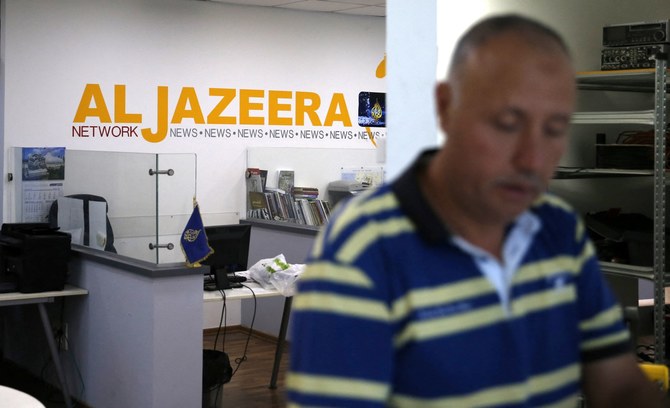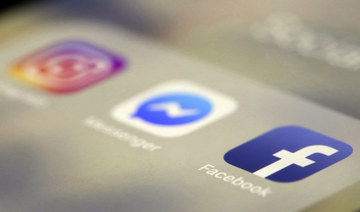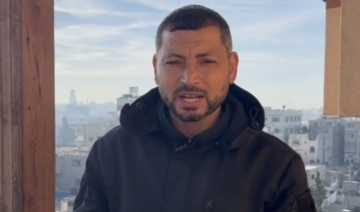ISTANBUL: It looked innocent enough.
As Turkey burned, ravaged by its deadliest and most destructive wildfires in living memory, #HelpTurkey began trending on Twitter, supported by sympathetic celebrities and traumatized Turks.
But in a deeply divided country where even minor events spark culture wars between President Recep Tayyip Erdogan’s supporters and opponents, the hashtag turned into a scandal, leading to a prosecutors’ probe.
The powerful Turkish leader, unexpectedly facing one of the most serious challenges of his 18-year rule, sounded scandalized by the idea that his country needed help, even as the government revealed it no longer had functioning firefighting planes.
“In response to this, there’s only one thing we can say: Strong Turkey,” Erdogan said after Friday prayers, mentioning a hashtag being circulated by his voters.
“A terror of lies is being spread from America, Europe and certain other places,” he said about the #HelpTurkey campaign.
Acting on Erdogan’s anger, the prosecutors’ office said it would investigate whether the posts were designed “to create anxiety, fear and panic in the public, and to humiliate the Turkish government.”
Around the same time, the media regulator threatened to fine TV channels that continued airing live footage of the fires or running stories “that provoke fear and worries in the public.”
Most stations complied, minimizing their coverage of a disaster that has killed eight people, destroyed forests across vast swathes of the Mediterranean and Aegean coasts, and upturned the lives of a generation of farmers.
The uproar stemmed in part from Erdogan’s proud nationalism, and in part from a perception among his opponents that cronyism and corruption were taking root.
Erdogan’s fiercest critics charge that he sacked capable leaders from top positions in the purges that followed a failed coup attempt in 2016, replacing them with friends and allies who were not up to the job.
An energetic, hands-on leader who rose to power on a popular anti-graft campaign, Erdogan’s own actions suddenly seemed out of touch.
Twitter exploded in outrage when he went on tour of the damaged region under heavy police escort, tossing bags of tea to locals out of a moving bus in the middle of the night while a megaphone announced his presence.
“Help us!!!!!” Turkish comedian Enis Arikan tweeted hours after Erdogan’s visit in a typical #HelpTurkey post. “We need planes urgently. We only have one world.”
In self-defense, the government is promoting a narrative that #HelpTurkey is being fanned by “sock puppets” — fake accounts designed to manipulate public opinion.
Marc Owen Jones, an assistant professor at Hamad bin Khalifa University in Qatar, told a media event organized by the presidency that his analysis showed up to five percent of the #HelpTurkey tweets being spread by such accounts.
“I don’t know the purpose of it. What I can say is that I guess the manipulation is happening of the hashtag... It looks fishy,” the British academic said.
“If it was started as a manipulation campaign it was very clever because #HelpTurkey is a really innocent message, you can understand why people tweeted. Why wouldn’t an average person want to help?“
Gareth Jenkins, a veteran Turkey analyst, said this criticism cuts both ways.
Erdogan’s government “oversees thousands of fake accounts, which they use to troll and try to intimidate into silence anyone who questions its narratives,” Jenkins told AFP.
“But I think a much greater problem is that a large number of Turks, including many of those around Erdogan, actually believe the regime’s propaganda.”
The battle over #HelpTurkey comes with the screws tightening on social media, which had remained an area of spirited debate in a country dominated by pro-government media and newspapers.
After initial resistance, Twitter, Facebook and others have complied with a new law requiring platforms to appoint local envoys who can handle court orders to take down contentious posts.
Erdogan says his government will submit another bill to parliament in October to further regulate social media, although he has not explained how.
Yaman Akdeniz, a digital rights expert who questions the strength of Jones’s “sock puppet” analysis, said Turks’ pleas for outside assistance were “real and not a hoax.”
“While the hashtag wars continue on the social media platforms, the fires continue in real life,” Akdeniz told AFP.
“In reality, we have a seriously malfunctioning government machinery which in turn will undoubtedly introduce a new crime and law on disinformation to further silence critical voices on social media platforms,” he said.
#HelpTurkey: Hashtag sparks culture war over Turkish fires
https://arab.news/2g3be
#HelpTurkey: Hashtag sparks culture war over Turkish fires

- “A terror of lies is being spread from America, Europe and certain other places,” President Recep Tayyip Erdogan said about the #HelpTurkey campaign
- The state media regulator threatened to fine TV channels that continued airing live footage of the fires or running stories “that provoke fear and worries in the public”
’Everybody is vulnerable’: Fake US school audio stokes AI alarm

- The clip, which left administrators of Pikesville High School fielding a flood of angry calls and threats, underscores the ease with which widely available AI and editing tools can be misused to impersonate celebrities and everyday citizens alike
WASHINGTON: A fabricated audio clip of a US high school principal prompted a torrent of outrage, leaving him battling allegations of racism and anti-Semitism in a case that has sparked new alarm about AI manipulation.
Police charged a disgruntled staff member at the Maryland school with manufacturing the recording that surfaced in January — purportedly of principal Eric Eiswert ranting against Jews and “ungrateful Black kids” — using artificial intelligence.
The clip, which left administrators of Pikesville High School fielding a flood of angry calls and threats, underscores the ease with which widely available AI and editing tools can be misused to impersonate celebrities and everyday citizens alike.
In a year of major elections globally, including in the United States, the episode also demonstrates the perils of realistic deepfakes as the law plays catch-up.
“You need one image to put a person into a video, you need 30 seconds of audio to clone somebody’s voice,” Hany Farid, a digital forensics expert at the University of California, Berkeley, told AFP.
“There’s almost nothing you can do unless you hide under a rock.
“The threat vector has gone from the Joe Bidens and the Taylor Swifts of the world to high school principals, 15-year-olds, reporters, lawyers, bosses, grandmothers. Everybody is now vulnerable.”
After the official probe, the school’s athletic director, Dazhon Darien, 31, was arrested late last month over the clip.
Charging documents say staffers at Pikesville High School felt unsafe after the audio emerged. Teachers worried the campus was bugged with recording devices while abusive messages lit up Eiswert’s social media.
The “world would be a better place if you were on the other side of the dirt,” one X user wrote to Eiswert.
Eiswert, who did not respond to AFP’s request for comment, was placed on leave by the school and needed security at his home.
When the recording hit social media in January, boosted by a popular Instagram account whose posts drew thousands of comments, the crisis thrust the school into the national spotlight.
The audio was amplified by activist DeRay McKesson, who demanded Eiswert’s firing to his nearly one million followers on X. When the charges surfaced, he conceded he had been fooled.
“I continue to be concerned about the damage these actions have caused,” said Billy Burke, executive director of the union representing Eiswert, referring to the recording.
The manipulation comes as multiple US schools have struggled to contain AI-enabled deepfake pornography, leading to harassment of students amid a lack of federal legislation.
Scott Shellenberger, the Baltimore County state’s attorney, said in a press conference the Pikesville incident highlights the need to “bring the law up to date with the technology.”
His office is prosecuting Darien on four charges, including disturbing school activities.
Investigators tied the audio to the athletic director in part by connecting him to the email address that initially distributed it.
Police say the alleged smear-job came in retaliation for a probe Eiswert opened in December into whether Darien authorized an illegitimate payment to a coach who was also his roommate.
Darien made searches for AI tools via the school’s network before the audio came out, and he had been using “large language models,” according to the charging documents.
A University of Colorado professor who analyzed the audio for police concluded it “contained traces of AI-generated content with human editing after the fact.”
Investigators also consulted Farid, writing that the California expert found it was “manipulated, and multiple recordings were spliced together using unknown software.”
AI-generated content — and particularly audio, which experts say is particularly difficult to spot — sparked national alarm in January when a fake robocall posing as Biden urged New Hampshire residents not to vote in the state’s primary.
“It impacts everything from entire economies, to democracies, to the high school principal,” Farid said of the technology’s misuse.
Eiswert’s case has been a wake-up call in Pikesville, revealing how disinformation can roil even “a very tight-knit community,” said Parker Bratton, the school’s golf coach.
“There’s one president. There’s a million principals. People are like: ‘What does this mean for me? What are the potential consequences for me when someone just decides they want to end my career?’“
“We’re never going to be able to escape this story.”
Lawsuit against Meta asks if Facebook users have right to control their feeds using external tools

- The tool, called Unfollow Everything 2.0, is a browser extension that would let Facebook users unfollow friends, groups and pages and empty their newsfeed — the stream of posts, photos and videos that can keep them scrolling endlessly
Do social media users have the right to control what they see — or don’t see — on their feeds?
A lawsuit filed against Facebook parent Meta Platforms Inc. is arguing that a federal law often used to shield Internet companies from liability also allows people to use external tools to take control of their feed — even if that means shutting it off entirely.
The Knight First Amendment Institute at Columbia University filed a lawsuit Wednesday against Meta Platforms on behalf of an Amherst professor who wants to release a tool that enables users to unfollow all the content fed to them by Facebook’s algorithm.
The tool, called Unfollow Everything 2.0, is a browser extension that would let Facebook users unfollow friends, groups and pages and empty their newsfeed — the stream of posts, photos and videos that can keep them scrolling endlessly. The idea is that without this constant, addicting stream of content, people might use it less. If the past is any indication, Meta will not be keen on the idea.
A UK developer, Louis Barclay, released a similar tool, called Unfollow Everything, but he took it down in 2021, fearing a lawsuit after receiving a cease-and-desist letter and a lifetime Facebook ban from Meta, then called Facebook Inc.
With Wednesday’s lawsuit, Ethan Zuckerman, a professor at the University of Massachusetts at Amherst, is trying to beat Meta to the legal punch to avoid getting sued by the social media giant over the browser extension.
“The reason it’s worth challenging Facebook on this is that right now we have very little control as users over how we use these networks,” Zuckerman said in an interview. “We basically get whatever controls Facebook wants. And that’s actually pretty different from how the Internet has worked historically.” Just think of email, which lets people use different email clients, or different web browsers, or anti-tracking software for people who don’t want to be tracked.
Meta declined to comment.
The lawsuit filed in federal court in California centers on a provision of Section 230 of the 1996 Communications Decency Act, which is often used to protect Internet companies from liability for things posted on their sites. A separate clause, though, provides immunity to software developers who create tools that “filter, screen, allow, or disallow content that the provider or user considers to be obscene, lewd, lascivious, filthy, excessively violent, harassing, or otherwise objectionable.”
The lawsuit, in other words, asks the court to determine whether Facebook users’ news feed falls into the category of objectionable material that they should be able to filter out in order to enjoy the platform.
“Maybe CDA 230 provides us with this right to build tools to make your experience of Facebook or other social networks better and to give you more control over them,” said Zuckerman, who teaches public policy, communication and information at Amherst. “And you know what? If we’re able to establish that, that could really open up a new sphere of research and a new sphere of development. You might see people starting to build tools to make social networks work better for us.”
While Facebook does allow users to manually unfollow everything, the process can be cumbersome with hundreds or even thousands of friends, groups and businesses that people often follow.
Zuckerman also wants to study how turning off the news feed affects people’s experience on Facebook. Users would have to agree to take part in the study — using the browser tool does not automatically enroll participants.
“Social media companies can design their products as they want to, but users have the right to control their experience on social media platforms, including by blocking content they consider to be harmful,” said Ramya Krishnan, senior staff attorney at the Knight Institute. “Users don’t have to accept Facebook as it’s given to them. The same statute that immunizes Meta from liability for the speech of its users gives users the right to decide what they see on the platform.”
Netanyahu’s Cabinet votes to permanently close Al Jazeera offices in Israel

- Vote comes amid deeply strained ties between Israel and the channel, which have worsened during the war against Hamas
TEL AVIV: Israeli Prime Minister Benjamin Netanyahu said on Sunday that his government has voted unanimously to shutter the offices of the Qatar-owned broadcaster Al Jazeera in Israel.
Netanyahu announced the decision on X, formerly Twitter. Details on when it would go into effect or whether it was permanent or temporary were not immediately clear.
The vote comes amid deeply strained ties between Israel and the channel, which have worsened during the war against Hamas.
It also comes as Qatar is helping to broker a cease-fire agreement between Israel and Hamas in the war in Gaza.
Warren Buffett says AI may be better for scammers than society. And he’s seen how

- The billionaire investing guru predicted scammers will seize on the technology, and may do more harm with it than society can wring good
OMAHA, Nebraska: Warren Buffett cautioned the tens of thousands of shareholders who packed an arena for his annual meeting that artificial intelligence scams could become “the growth industry of all time.”
Doubling down on his cautionary words from last year, Buffett told the throngs he recently came face to face with the downside of AI. And it looked and sounded just like him. Someone made a fake video of Buffett, apparently convincing enough that the so-called Oracle of Omaha himself said he could imagine it tricking him into sending money overseas.
The billionaire investing guru predicted scammers will seize on the technology, and may do more harm with it than society can wring good.
“As someone who doesn’t understand a damn thing about it, it has enormous potential for good and enormous potential for harm and I just don’t know how that plays out,” he said.
EARNINGS BEFORE MUSINGS
The day started early Saturday with Berkshire Hathaway announcing a steep drop in earnings as the paper value of its investments plummeted and it pared its Apple holdings. The company reported a $12.7 billion profit, or $8.825 per Class A share, in first the quarter, down 64 percent from $35.5 billion, or $24,377 per A share a year ago.
But Buffett encourages investors to pay more attention to the conglomerate’s operating earnings from the companies it actually owns. Those jumped 39 percent to $11.222 billion, or $7,796.47 per Class A share, led by insurance companies’ performance.
None of it that got in the way of the fun.
Throngs flooded the arena to buy up Squishmallows of Buffett and former Vice Chairman Charlie Munger, who died last fall. The event attracts investors from all over the world and is unlike any other company meeting. Those attending for the first time are driven by an urgency to get here while the 93-year-old Buffett is still alive.
“This is one of the best events in the world to learn about investing. To learn from the gods of the industry,” said Akshay Bhansali, who spent the better part of two days traveling from India to Omaha.
A NOTABLE ABSENCE
Devotees come from all over the world to vacuum up tidbits of wisdom from Buffett, who famously dubbed the meeting ‘Woodstock for Capitalists.’
But a key ingredient was missing this year: It was the first meeting since Munger died.
The meeting opened with a video tribute highlighting some of his best known quotes, including classic lines like “If people weren’t so often wrong, we wouldn’t be so rich.” The video also featured skits the investors made with Hollywood stars over the years, including a “Desperate Housewives” spoof where one of the women introduced Munger as her boyfriend and another in which actress Jaimie Lee Curtis swooned over him.
As the video ended, the arena erupted in a prolonged standing ovation honoring Munger, whom Buffett called “the architect of Berkshire Hathaway.”
Buffett said Munger remained curious about the world up until the end of his life at 99, hosting dinner parties, meeting with people and holding regular Zoom calls.
“Like his hero Ben Franklin, Charlie wanted to understand everything,” Buffett said.
For decades, Munger and Buffett functioned as a classic comedy duo, with Buffett offering lengthy setups to Munger’s witty one-liners. He once referred to unproven Internet companies as “turds.”
Together, the pair transformed Berkshire from a floundering textile mill into a massive conglomerate made up of a variety of interests, from insurance companies such as Geico to BNSF railroad to several major utilities and an assortment of other companies.
Munger often summed up the key Berkshire’s success as “trying to be consistently not stupid, instead of trying to be very intelligent.” He and Buffett also were known for sticking to businesses they understood well.
“Warren always did at least 80 percent of the talking. But Charlie was a great foil,” said Stansberry Research analyst Whitney Tilson, who was looking forward to his 27th consecutive meeting.
NEXT GEN LEADERS
Munger’s absence, however, created space for shareholders to get to know better the two executives who directly oversee Berkshire’s companies: Ajit Jain, who manages the insurance units; and Abel, who handles everything else and has been named Buffett’s successor. The two shared the main stage with Buffett this year.
The first time Buffett kicked a question to Abel, he mistakenly said “Charlie?” Abel shrugged off the mistake and dove into the challenges utilities face from the increased risk of wildfires and some regulators’ reluctance to let them collect a reasonable profit.
Morningstar analyst Greggory Warren said he believes Abel spoke up more Saturday and let shareholders see some of the brilliance Berkshire executives talk about.
“Greg’s a rock star,” said Chris Bloomstran, president of Semper Augustus Investments Group. “The bench is deep. He won’t have the same humor at the meeting. But I think we all come here to get a reminder every year to be rational.”
A LOOK TO THE FUTURE
Buffett has made clear that Abel will be Berkshire’s next CEO, but he said Saturday that he had changed his opinion on how the company’s investment portfolio should be handled. He had previously said it would fall to two investment managers who handle small chunks of the portfolio now. On Saturday, Buffett endorsed Abel for the gig, as well as overseeing the operating businesses and any acquisitions.
“He understands businesses extremely well. and if you understand businesses, you understand common stocks,” Buffett said. Ultimately, it will be up to the board to decide, but the billionaire said he might come back and haunt them if they try to do it differently.
Overall, Buffett said Berkshire’s system of having all the noninsurance companies report to Abel and the insurers report to Jain is working well. He himself hardly gets any calls from managers anymore because they get more guidance from Abel and Jain.
“This place would work extremely well the next day if something happened to me,” Buffett said.
Nevertheless, the best applause line of the day was Buffett’s closing remark: “I not only hope that you come next year but I hope that I come next year.”
Lebanese security forces arrest ‘TikTok influencer’ using platform to lure, assault minors

- Lebanese police say they arrested six, including three minors, involved in sexual assaults against minors
LONDON: Lebanese authorities arrested on Wednesday six people for their alleged involvement in sexual assaults on children, sometimes using the video-sharing platform TikTok to lure minors.
The Internal Security Forces said in a statement that among those arrested was a “TikTok influencer,” who is also a hairdresser, according to local media.
The six suspects are reportedly part of a criminal network comprising around 30 individuals involved in assaults against at least 30 children.
The Lebanese police said in a statement that “based on information obtained by the Cybercrime Bureau of the Judicial Police, and following a complaint lodged by a number of minors with the Public Prosecutor’s Office concerning sexual assaults, compromising photos and incitement to take drugs by members of a gang, the bureau in question has been able to arrest, to date, six people in Beirut, Mount Lebanon and North Lebanon.”
The arrested suspects also include three minors of Lebanese, Turkish, and Syrian nationalities who were active on TikTok, according to the statement.
Highlighting that the case has been probed for about a month, the Lebanese police vowed that “the investigation is continuing with a view to arresting all members of the gang.”
The head of the network, a famous TikTok personality, purportedly abused his fame and invited children to shoot TikTok videos with him, the independent Lebanese TV channel Al-Jadeed reported.
The TikToker would cut the children’s hair to gain their trust before inviting them to a party, where his accomplices sexually assaulted the children.





















